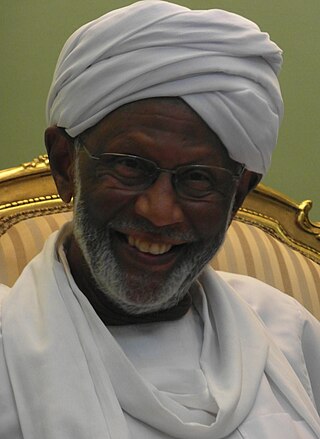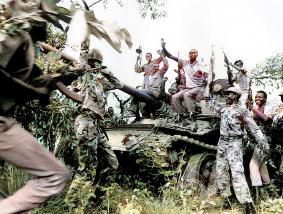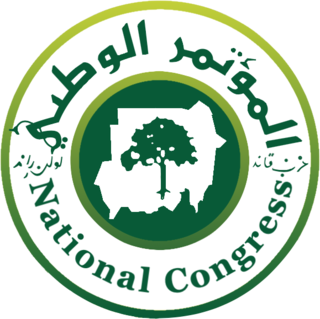Related Research Articles

Sudan, officially the Republic of the Sudan, is a country in Northeast Africa. It is bordered by the Central African Republic to the southwest, Chad to the west, Egypt to the north, Eritrea to the northeast, Ethiopia to the southeast, Libya to the northwest, South Sudan to the south and the Red Sea. It has a population of 45.7 million people as of 2022 and occupies 1,886,068 square kilometres, making it Africa's third-largest country by area, and the third-largest by area in the Arab League. It was the largest country by area in Africa and the Arab League until the secession of South Sudan in 2011, since which both titles have been held by Algeria. Its capital city is Khartoum and its most populous city is Omdurman.

The Zimbabwe African National Union – Patriotic Front (ZANU–PF) is a political organisation which has been the ruling party of Zimbabwe since independence in 1980. The party was led for many years under Robert Mugabe, first as prime minister with the Zimbabwe African National Union (ZANU) and then as president from 1987 after the merger with the Zimbabwe African People's Union (ZAPU) and retaining the name ZANU–PF, until 2017, when he was removed as leader.

Jaafar Muhammad an-Nimeiry was a Sudanese politician who served as the president of Sudan from 1969 to 1985.

Modibo Keïta was a Malian politician who served as the first President of Mali from 1960 to 1968. He espoused a form of African socialism.

Hassan 'Abd Allah al Turabi was a Sudanese Islamist politician who was considered "the true architect" of the 1989 coup that brought Omar al-Bashir to power. He has been called "one of the most influential figures in modern Sudanese politics" and a "longtime hard-line ideological leader". He was instrumental in institutionalizing sharia in the northern part of the country and was frequently imprisoned in Sudan, but these "periods of detention" were "interspersed with periods of high political office".

The Second Sudanese Civil War was a conflict from 1983 to 2005 between the central Sudanese government and the Sudan People's Liberation Army. It was largely a continuation of the First Sudanese Civil War of 1955 to 1972. Although it originated in southern Sudan, the civil war spread to the Nuba mountains and the Blue Nile. It lasted for 22 years and is one of the longest civil wars on record. The war resulted in the independence of South Sudan six years after the war ended.

Anarchism in Africa refers both to purported anarchic political organisation of some traditional African societies and to modern anarchist movements in Africa.

Slavery in Sudan began in ancient times, and had a resurgence during the Second Sudanese Civil War (1983–2005). During the Trans-Saharan slave trade, many Nilotic peoples from the lower Nile Valley were purchased as slaves and brought to work elsewhere in North Africa and the Orient by Nubians, Egyptians, Berbers and Arabs.

The National Congress Party was a major political party that dominated domestic politics in Sudan from its foundation until the Sudanese Revolution.
The National Islamic Front was an Islamist political organization founded in 1976 and led by Dr. Hassan al-Turabi that influenced the Sudanese government starting in 1979, and dominated it from 1989 to the late 1990s. It was one of only two Islamic revival movements to secure political power in the 20th century.
The National Democratic Alliance (NDA) is a group of Sudanese political parties that was formed in 1989 to oppose the regime of Omar Hassan al-Bashir after he seized power in a military coup on June 6, 1989. The NDA signed a deal with the Sudanese government on June 18, 2005, following a peace agreement to end the Second Sudanese Civil War on January 9, 2005. Some issues have yet to be resolved by opposing factions, including the conflict and humanitarian issues in the war-torn region of Darfur. After further violent clashes in the east, a separate peace deal was signed with the Beja Congress in October 2006.

The Sudanese Communist Party is a communist party in Sudan. Founded in 1946, it was a major force in Sudanese politics in the early post-independence years, and was one of the two most influential communist parties in the Arab world, the other being the Iraqi Communist Party.
The Sudanese Communist Party – Revolutionary Leadership was a communist party in Sudan. It emerged as a pro-Chinese split, after internal division inside the Sudanese Communist Party in August 1964.
The Sudanese Movement of Revolutionary Committees was a political movement in Sudan, whose ideology was based on The Green Book of Muammar Gaddafi. The organization was established in May 1985. The movement, which emerged as an outgrowth of the Tripoli-based Sudanese People's Socialist Front, was financially supported by the Libyan government. The movement was led by Abdullah Zakaria.

The Arab Socialist Ba'ath Party, also referred to as the pro-Iraqi Ba'ath movement, is a Ba'athist political party which was headquartered in Baghdad, Iraq until 2003. It is one of two parties which emerged from the 1966 split of the original Ba'ath Party.

The Arab Socialist Ba'ath Party – Region of Sudan, previously known as the Arab Socialist Ba'ath Party – Country of Sudan, is a political party in Sudan. The party is the Sudanese regional branch of the Iraqi-led Ba'ath Party in Sudan. While the branch has always been small, accounting for an estimated 1,000 members in 2003, it has been able to have a bigger impact than what its meager membership numbers would suggest, mostly due to Iraqi financing of the branch.
The Socialist Republican Party was a political party in Sudan, founded in 1951. Ibrahim Bedri was the general secretary of the party. The party was floated ahead of the 1953 Sudanese legislative election. The party mobilized a section of tribal chiefs and sheikhs. However, the development of the Socialist Republican Party never took off, and the party lacked financial resources, organizational structures and a coherent programme.
References
- ↑ Africa Research, Ltd. Africa Research Bulletin, Volume 21 . Political, Social, and Cultural Series. Exeter, England: Africa Research, 1984. p. 7448
- ↑ Woodward, P. (1991). Sudan After Nimeiri. Routledge. p. 49. ISBN 9780415004800 . Retrieved 2015-08-02.
- ↑ Political Handbook of the World : 1999: Governments and Intergovernmental Organizations As of March 1, 1999 or Later : (with Major Political Developments Noted Through June 1, 1999) . Binghamton, N.Y.: CSA Publications, 1999. p. 924